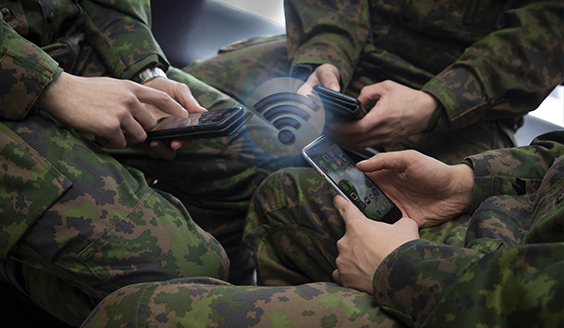#Agents - Young People's Agency in Social Media
Dark side of social media - Perspective of comprehensive security
How are young people equipped to recognise risks of informational influence and to protect themselves from them? How does social media affect the situation picture of young people’s safety and security? How do discussions in social media affect attitudes towards personal and national security? The National Defence University seeks answers to these questions by examining how young people act in social media, focusing especially on the perspectives of informational influence, propaganda, safety and security.

This multi-disciplinary consortium (Finnish National Defence University, University of Jyväskylä, and University of Helsinki) studies how young people, aged 13-19, act in social media environments both as influencers and targets of influence. The focus is both on threats and possibilities - the bright and dark sides - of their agency. #Agents, funded by the Academy of Finland, is part of the Media and Society (MediaSoc) research programme. This consortium combines approaches from military sciences, sociology, psychology, marketing, educational science, and leadership. We work together with the Swiss Military Academy (Military Academy at ETH Zurich) and Newcastle University (UK).
In #Agents, we study how agency in social media is related to young people's identities, world-views, emotions, well-being and, feelings of safety and security at both personal and national levels. Our aim is to develop conceptual and practical tools for social media use to strengthen young people´s positive agency and media literacy in social media environments. In the long term, we aim to strengthen young people's agency and well-being in society as well as national security.
Publications and media coverage
Research publications
Norri-Sederholm T, Norvanto E, Talvitie-Lamberg K, Huhtinen A-M. (2020) Social Media as the Pulse of Misinformation and Disinformation in National Security. In Moehlecke de Baseggio E., Schneider O., Szvircsev Tresch T. (Eds.) Social Media and the Armed Forces. Advanced Sciences and Technologies for Security Applications. Springer, Cham. pp. 207-225.
Norri-Sederholm T, Riikonen R, Moilanen, P, Huhtinen A-M. (2020). Young People and the Dark Side of Social Media – Possible Threats to National Security. In Eze T, Speakman L. & Onwubiko C. (eds.) Proc. of the 19th European Conference on Cyber Warfare and Security. ECCWS-2020. pp. 278-283. Academic Conferences and Publishing International Limited.
Riikonen R, Norri-Sederholm T, Huhtinen A-M. (2020). Not a Problem for me: Young Men’s Conceptions of Their Social Media Use and False Information. In Karpasitis C. & Varda C. (eds.) Proc. of the 7th European Conference on Social Media. ECSM-2020. pp. 240-246. Academic Conferences and Publishing International Limited.
Norri-Sederholm T, Norvanto E, Talvitie-Lamberg K, Huhtinen A-M. (2019). Social Media as the Pulse of National Security Threats: A Framework for Studying How Social Media Influences Young People’s Safety and Security Situation Picture. In Popma, W. & Francis, S. (eds.) Proc. of the 6th European Conference on Social Media. ECSM 2019. pp. 231-237. Academic Conferences and Publishing International Limited.
Hanaholmen's Discussing democracy: Hybrid Threats, Security Policy and Democracy: https://www.youtube.com/watch?v=_fn98voAbmU

Contact
Military Professor of Leadership
LTC (GS), PhD Aki-Mauri Huhtinen
[email protected]
tel. +358 299 530 402
Adj. Prof., PhD Teija Norri-Sederholm
[email protected]
tel. +358 299 530 629
PhD Miina Kaarkoski
[email protected]
tel. +358 299 530 423
M.Sc Milla Alaraatikka
[email protected]
tel. +358 299 530 726
Research assistant
B.A. Emil Tillander
[email protected]
Research assistant
M.Res. Juho Äijälä
[email protected]
Funding: Academy of Finland



